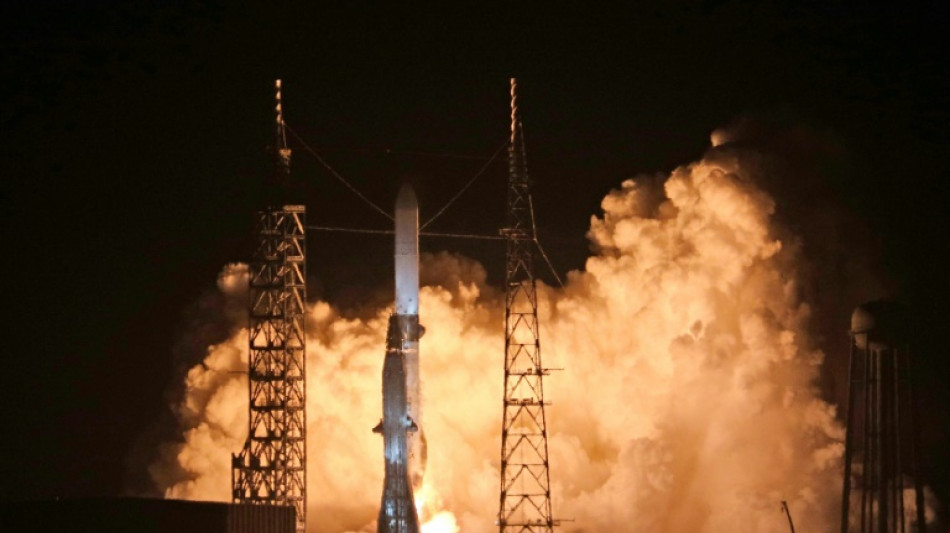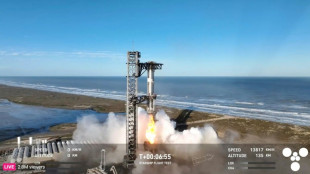

Blue Origin's New Glenn rocket blasts into orbit for first time
Blue Origin, the space company founded by billionaire Jeff Bezos, launched its massive New Glenn rocket into orbit for the first time early Thursday, a livestream of the blastoff showed.
The rocket, whose inaugural mission had been delayed by several years, blasted off at 2:03 am (0703 GMT) from the Cape Canaveral Space Force Station in the US state of Florida, the webcast showed.
The mission is seen as critical to Blue Origin's efforts to compete with Elon Musk's SpaceX, which dominates the commercial space industry.
"LIFTOFF! New Glenn is beginning its first ever ascent toward the stars," Blue Origin said on social media platform X.
"New Glenn has passed the Karman line, the internationally recognized boundary of space!" the firm posted just a few minutes later.
And then: "Second stage engine cutoff confirmed. New Glenn's second stage and payload are now in orbit."
Blue Origin executive Ariane Cornell, speaking during the launch livestream, said the mission had achieved its "main objective" of reaching orbit.
But she also confirmed "that we did, in fact, lose the booster," which they were trying to land on a drone ship stationed about 620 miles (1,000 kilometers) downrange in the Atlantic Ocean.
Rival SpaceX has made such landings now routine, but this would have been Blue Origin's first shot at the feat.
Blue Origin has experience landing its New Shepard rockets -- used for suborbital tourism -- but they are five times smaller and land on terra firma rather than a ship at sea.
Fellow billionaire Musk commended Bezos on New Glenn's inaugural launch, offering congratulations "on reaching orbit on the first attempt" in a post on his X platform.
The blastoff on Thursday was briefly delayed by a boat entering the launch zone, with a message on the Blue Origin webcast saying: "Please stand by: We are awaiting a wayward boat to clear the range."
- Repeated delays -
An initial test launch of the towering 320-foot (98-meter) rocket, dubbed New Glenn in honor of American astronaut John Glenn, had been scrubbed early Monday after repeated halts during the countdown.
The company later said it had discovered an icing issue on a purge line and postponed the launch.
With the latest mission, dubbed NG-1, Amazon founder Bezos was taking aim at the only man in the world wealthier than him: fellow tech innovator Musk.
Musk's SpaceX dominates the orbital launch market through its prolific Falcon 9 rockets, which have become vital for the commercial sector, Pentagon and NASA.
"SpaceX has for the past several years been pretty much the only game in town, and so having a competitor... this is great," G. Scott Hubbard, a retired senior NASA official, earlier told AFP, expecting the competition to drive down costs.
Upping the high-stakes rivalry, SpaceX also plans another orbital test this week of Starship -- its gargantuan new-generation rocket.
Blue Origin CEO Dave Limp voiced optimism on Thursday, posting on X: "We did it! Orbital. Great night for Team Blue. On to spring and trying again on the landing."
- Blue Ring -
Aboard the New Glenn test flight and now in orbit is a Defense Department-funded prototype of an advanced spaceship called Blue Ring, which could one day journey through the solar system.
Physically, the gleaming white New Glenn rocket dwarfs SpaceX's 230-foot Falcon 9 and is designed for heavier payloads.
It slots between Falcon 9 and its big sibling, Falcon Heavy, in terms of mass capacity but holds an edge with its wider payload fairing, capable of carrying the equivalent of 20 trucks.
Blue Origin has already secured a NASA contract to launch two Mars probes aboard New Glenn. The rocket will also support the deployment of Project Kuiper, a satellite internet constellation designed to compete with Starlink.
Like Musk, Bezos has a lifelong passion for space.
But where Musk dreams of colonizing Mars, Bezos envisions shifting heavy industry off-planet onto floating space platforms in order to preserve Earth, "humanity's blue origin."
V.Martin--ESF




